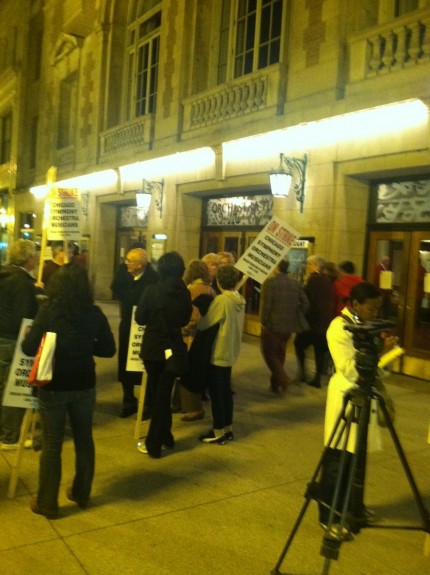Health insurance contributions at the heart of Chicago Symphony musicians’ strike

Audience members arriving for Saturday evening’s Chicago Symphony Orchestra concert were greeted by striking musicians carrying picket signs in front of the hall and the news that there would be no performance.
Talks broke down at 6:15 p.m. this evening with CSO musicians walking out of negotiations with management after rejecting what CSO president Deborah Rutter called “our last, best and final offer.”
The two sides are far apart and there appears to be a very real possibility that the strike could imperil the CSO’s upcoming Carnegie Hall concerts and tour to Mexico in October.
Grim-faced at a hastily arranged press conference at the orchestra’s Michigan Avenue home, Rutter said that “It’s a sad day for Chicago and a sad day for the CSO and their audiences.” She stated that the health contribution issue is the major sticking point.
Management is holding firm to their demand that CSO musicians increase their contributions to their health insurance. Currently CSO musicians pay 5% of their health care premiums while the Chicago Symphony Orchestra Association picks up 95%.
Management has proposed that the musicians increase their contribution to 12%. The union has countered that they would only agree to that if the 7% difference was covered with additional wages in the new contract, which management has rejected. “They’re doing very well by what the national standard is,” said Rutter of the CSO musicians’ health care.
On the salary issue, management has proposed a 4.48% percent wage increase over three years, a stark contrast to the musicians’ last contract which raised players’ salaries 25% over five years.
Current average pay for a CSO member is among the highest compensation for orchestra players in the country at $144,820 with built-in risers to $173,000 for seniority and overtime. Management also pointed out in a fact sheet distributed Saturday that CSO members receive 12 weeks of paid vacation every year, and a $75,000 yearly contributed pension plan for retirees.
Cellist David Sanders who is on the players’ negotiating committee said the musicians have given back enough both in past and current contracts but that management keeps requesting more.
“They’re asking for major concessions,” said Sanders who was picketing outside the hall Saturday night with CSO colleagues. “It’s thousands of dollars in givebacks. We spent weeks [negotiating and] giving them everything they asked for, and they continue to take away and take away and take away.”
The strike by members of the Chicago Federation of Musicians Local 10-208 is the first by CSO players in 21 years. In 1991, a CSO musicians strike lasted three weeks.
Currently, there are no planned meetings between the two sides. The next scheduled CSO concert is Wednesday night.
Patrons holding tickets for tonight’s canceled concert may exchange them for another Symphony Center event. Call 312-294-3000.
Posted in News



Posted Sep 23, 2012 at 3:32 am by Roland Buck
However justified the musicians’ grievances may (or may not) be, calling a strike an hour before a scheduled concert, when many people had traveled from long distances to get there, is a slap in the face of the concert audiences. If they wanted to strike, they could have called it effective the next concert, so that people would have been notified and stayed home. Among other things, this is going to adversely hurt contributions to the symphony by alienated supporters.
Posted Sep 24, 2012 at 12:29 am by Sam Mihailoff
The pay scale may appear to be luscious.
Just several points to consider
1- – The years of study to perfect their “craft” far exceeds the most talented brain surgeon, nuclear physicist, or any other occupation for that matter.
2- – The cost and maintenance of their instruments alone is exorbitant
Of course we could just eliminate culture altogether from our society. “Rap” has already had a devastating blow!!!